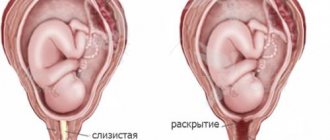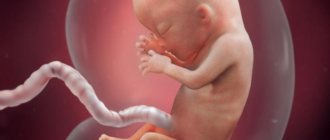What is urinary incontinence in pregnant women?
This pathology occurs in almost every third pregnant woman.
In the last trimester, more than half suffer from it. Sometimes a woman may not even suspect that she has this problem. The fact is that the discharge from the bladder is insignificant; only in some cases it may be necessary to wear pads. Urine may be released during pregnancy when you sneeze, cough, laugh, or blow your nose. This can happen when a woman sits down in a chair or gets out of bed.
While carrying a baby, a woman's urinary system functions a little differently. It is difficult for expectant mothers to empty the bladder completely. For this reason, the urge is frequent and may bother you at night. In the last months of pregnancy, the volume of urine increases, but its output during urination decreases. This is due to the enlarged uterus, which puts pressure on the bladder.
Urinary incontinence or leakage of amniotic fluid: how to distinguish?
Premature rupture of membranes is a condition that threatens the health of the mother and fetus. It may appear suddenly for no apparent reason. Then active labor begins.
In 40% of cases, the amniotic membranes are not completely ruptured, so the clinical picture resembles urinary incontinence.
It is difficult to identify pathology on your own, so if you have any doubts, you should immediately consult a doctor. The following signs can help in differential diagnosis:
- amniotic fluid is odorless and colorless;
- with complete rupture of the membranes, a sharp pain syndrome and copious discharge appear;
- the outpouring of amniotic fluid increases in the supine position and cannot be stopped when the muscles of the perineum are tense.
The hardest thing to recognize is small tears and microcracks in the amniotic sac.
Two methods can be used for diagnosis.
Using test strips
The strips contain a reagent that reacts to slightly alkaline liquids. Upon contact with amniotic fluid, litmus paper will change color. This is an approximate indicator of rupture of the membranes.
How does the frequency of urination in a pregnant woman change by trimester?
First trimester
Urinary incontinence during pregnancy can occur from the first weeks. This is one of the signs that a woman will soon become a mother.
Second trimester
From weeks 14 to 27, this problem may disappear or become significantly smaller. During this period, the uterus grows and rises, thereby easing pressure on the bladder.
Third trimester
Incontinence manifests itself especially clearly. During this period, the load on the excretory system increases. The situation is aggravated when the fetus is too large or incorrectly positioned. Leakage is especially important for physically unprepared women or when pregnancy occurs after a recent birth.
After the baby is born, the woman will experience frequent urge to go to the toilet. This way the body will get rid of excess fluid that has accumulated during pregnancy.
What are the manifestations of the disease?
A woman may exhibit both obvious signs of incontinence and moderate ones, when urine leaks are scanty and almost unnoticeable against the background of discharge accompanying pregnancy. Typical symptoms of incontinence include:
- the urge to go to the toilet is frequent, it is difficult to restrain urination;
- a feeling of urine leaking when coughing, laughing, or minor exertion;
- uncontrolled leakage of urine, including at night.
If incontinence is critical, a lot of urine is released or there is no urge, and urine flows out spontaneously, you should additionally consult a doctor.
Causes
The causes of urine leakage during pregnancy are:
- Enlarged uterus. As the fetus grows, it stretches and increases in size. Over time, it begins to put pressure on the bladder.
- The hormone progesterone. It is actively produced in the body of a pregnant woman, relaxes and changes muscles. Such changes also affect the bladder.
- Fetal activity. The child hits with his arms, legs, and changes his position. This increased activity is expressed by involuntary urination.
- Weight gain. Uncontrolled urine output is also affected by rapid weight gain.
This pathology is also inherent in women who have given birth several times in a row or lead a sedentary lifestyle.
If inflammation of the urinary system was present before pregnancy, it may worsen during pregnancy.
In this case, you should not be afraid, but you should definitely visit a urologist to prevent possible complications.
Why you need to do exercises for urinary incontinence
- The world-famous Kegel exercises will help restore tone to the muscles of the perineum and, accordingly, get rid of the problem. Gymnastics involves several exercises that are approved for use during pregnancy. For example, during this period the following training is acceptable: having started to empty the stream, hold the stream for a while, and then continue until the end, but with pressure. But before you start doing gymnastics, you need to make sure that this is allowed during pregnancy. It is better to consult with your pregnancy doctor.
Types of incontinence
There are several factors that provoke the development of pathology.
Based on them, incontinence is divided into types. The appearance of pathology due to weakening of the walls and nerve endings of the bladder. These are the consequences of hyperactivity of the hormone progesterone. The woman’s muscles are relaxed; after the urge, she simply does not have time to get to the toilet. The urge in this case is strong and sharp, and can cause the urinary tract to expel urine spontaneously.
Incontinence caused by stress or severe nervous tension. Such strong emotions cause muscles to tense. In pregnant women, they are weakened, which leads to urine leakage.
Full bladder. Sometimes it is simply impossible for women to completely release it.
Spontaneous discharge is also divided into leakage and incontinence. In the first case, a few drops are released after urination, and in the second, a small amount comes out without urge.
When bladder tone increases, leakage can become chronic. In this case, the volume of urine released will be greater.
When to see a doctor for urinary incontinence
Typically, episodes of urinary incontinence during pregnancy are physiological in nature and disappear immediately after delivery. You should consult a doctor if the following alarming symptoms appear:
- pain when emptying the bladder;
- involuntary urination at night;
- abundant regular bowel movements, regardless of external provoking factors;
- signs of inflammation of the urogenital tract (including cystitis, urethritis);
- the appearance of atypical impurities in the urine.
Urinary incontinence is an unpleasant symptom that reflects the state of the nervous and genitourinary systems. During pregnancy, all body reactions are exacerbated due to complex hormonal and anatomical changes.
Throughout the entire period of bearing a child, you should follow medical recommendations, attend an antenatal clinic according to a special schedule, and if you have any disturbing symptoms, tell your doctor about it.
Faced with an unpleasant surprise, a pregnant woman doubts whether to seek help from a doctor. She may experience symptoms of incontinence:
- Stressful. Urine excretion occurs after exertion - coughing, sneezing, laughing. A sharp contraction of the abdominal muscles increases pressure on the bladder. Liquid flows out in small portions.
- Imperative (urgent). Spontaneous urine leakage is caused by an overactive bladder. The woman feels a strong urge that she is unable to restrain.
- Bubble overflow. When compressed by the growing uterus, it decreases in volume and quickly fills. Inability to go to the toilet leads to urine leakage.
- Incontinence reflex. Uncontrolled urination is the result of a disturbance in the nervous reactions between the urinary system and the brain.
In 90% of cases, pregnant women experience the first two types of disorders.
What to do if you have incontinence
Firstly, you need to pay attention to hygiene. It is necessary to use pads daily and change underwear as soon as the need arises.
Briefs must be of a special cut designed for pregnant women. Models should be purchased only from natural fabrics without decorative details. Various ruffles can irritate the groin area. To avoid unnecessary pressure on the lower abdomen, panties must be selected according to size.
Toilet of the external genitalia should be performed at least 2 times a day. Hypoallergenic cosmetics for intimate hygiene are well suited for this.
When visiting the toilet, you should empty your bladder as much as possible. Don't ignore the urges. During urination, you can lean forward a little, this will open the urethra as much as possible. To get an excellent result, you need to push extra hard.
When sneezing or coughing, you should lean forward a little, bending your knees. The mouth should be kept wide open. This will relieve pressure on the diaphragm, which will prevent leakage.
It is also recommended to perform special exercises for the perineal muscles. These could be Kegel exercises or any other exercises aimed at strengthening them. It is worth learning to contract and relax the pelvic muscles. This skill will be useful during childbirth.
If incontinence during pregnancy appears late in pregnancy, the first thing to do is consult a doctor. A visit to a specialist will help determine whether the leakage is drops of urine or amniotic fluid.
Causes of urinary incontinence during pregnancy
Urinary incontinence during pregnancy, or enuresis, is a common cause of discomfort, awkwardness and self-doubt. Uncontrollable episodes of urination occur mainly during the daytime. Nocturnal enuresis usually indicates serious disturbances in the functioning of the body.
Enuresis is often associated with a woman’s psycho-emotional background, which also changes during the period of hormonal changes in the body. Discomfort associated with uncontrolled urinary incontinence during pregnancy occurs more often in the last months. This is due to a significant decrease in the volume of the bladder due to pressure from the uterus on it.
Urine leaks with any, even weak, muscle contraction. The likelihood of a symptom occurring is also affected by the number of pregnancies and births. In a healthy woman, leakage is rare during her first pregnancy. The more births, the higher the risk of involuntary urine leakage in the early and late stages of fetal development.
Drug correction is not indicated for pregnant women, since it may affect the fetus. To reduce symptoms, doctors recommend:
- Wear a prenatal bandage. It evenly distributes the load from the enlarged abdomen and reduces the impact of the uterus on the bladder. It can be worn during late pregnancy to prevent urinary incontinence.
- Frequent visits to the toilet and correct posture when urinating. You need to strain slightly, leaning forward, to better open the urinary tract.
- Limit fluid to one and a half liters per day. Excess leads to increased load on the excretory system, so you need to follow the drinking regime.
- Kegel exercises. Rhythmic contractions of the vaginal muscles strengthen them and enhance the supporting effect. You can exercise in any place and position.
- Traditional medicine. They have a gentle effect on the urinary system and reduce urinary incontinence. These are decoctions of sage, dill seeds, lingonberries with flowers and leaves. Use only after consultation with a doctor and there is no allergy.
It is recommended to reduce physical activity, follow a healthy diet, wear cotton underwear, and use urinary pads.
The body recovers after childbirth, organs and systems undergo reverse changes. Involuntary urination should disappear from a woman’s life within 5-7 months.
Loss of control over urinary continence after childbirth is a pathology and requires treatment by specialists - a gynecologist and urologist.
When muscle function and the relative position of the pelvic organs are disrupted, changes occur that cause urinary incontinence after pregnancy. This is facilitated by:
- permission of a large child;
- use of obstetric forceps;
- birth canal injuries;
- multiple births;
- polyhydramnios.
After a Caesarean section, damage to the nerve endings is possible. The woman does not feel the urge to urinate, or fluid flows out randomly when the abdominal muscles tense.
Urinary incontinence during pregnancy can be both normal and pathological. Small discharge that does not bother the woman is not a deviation and will disappear after childbirth.
If there are frequent and heavy discharges, you need to consult a doctor and undergo an examination. Infections and damage to the amniotic sac cannot be ruled out.
There are at least three types of urinary incontinence during pregnancy, which can be recognized by characteristic signs:
- Incontinence caused by stressful situations. May occur with a sharp cough, while laughing or sneezing. In general, it is associated with vibrations of the diaphragm and abdominal tension. Most often occurs in the first trimester.
- In urge incontinence, symptoms include a sudden urge to urinate. In this case, the expectant mother often simply does not have enough time to get to the toilet. A similar type of incontinence occurs during pregnancy due to irritation of the urinary canal, a common phenomenon during this period. Another “culprit” may be overstretching of the pelvic muscles and a malfunction in the nervous system of the expectant mother. Urinary urgency can occur either late in pregnancy or after childbirth.
- Full bladder syndrome is characterized by an inability to empty completely. It looks like this: a woman constantly feels an urgent urge to urinate, but upon leaving the toilet, she feels that there is still a little urine left in the ureter. This feature is explained by the flaccid walls of the bladder, stretched during pregnancy.
Although urinary incontinence during pregnancy is quite unpleasant and unaesthetic, this phenomenon is quite acceptable. In addition, when talking about this symptom, they do not mean uncontrolled full-fledged urine output, but just a couple of drops. However, for the woman’s personal peace of mind, it is still worth informing the doctor about this.
Treatment
There is no specific treatment for incontinence during pregnancy. These are natural disturbances in the functioning of the bladder. Therapy will be required if the problem is due to infection or inflammation.
Important! During pregnancy, you should not self-medicate or take folk remedies. Many herbs are not suitable for use by pregnant women. The problem of urinary incontinence should be resolved together with your doctor.
Typically, during pregnancy, the expectant mother takes antidepressants and drugs used to treat incontinence. All prescribed medications are only herbal based. They do not have any harmful effects on the unborn baby.
Your doctor may also prescribe herbal remedies. They have anti-inflammatory and antimicrobial effects. Antispasmodics will help you react more calmly to stressful situations.
In what cases should you urgently consult a doctor?
You should immediately consult a doctor or call an ambulance if:
- pain and burning appeared during urination;
- the urge to go to the toilet appears immediately after emptying the bladder;
- high temperature appeared;
- has a fever;
- there is blood in the urine.
These symptoms indicate the presence of an infection in the urinary tract. If left untreated, kidney damage or premature labor may occur.
Treatment while expecting a baby
If, after diagnosis, pathological processes are identified, then a treatment regimen is selected aimed at eliminating the provoking factor. For example, if there is an infection in the body, the spread of which has led to inflammation of the bladder and its dysfunction, then antibiotics are selected.
It is important to cure the disease in a timely manner, otherwise there will be consequences not only for the woman, but also for the unborn child.
For incontinence caused by natural changes in the expectant mother, the following treatment is primarily prescribed:
- Kegel exercises to help train the muscles of the perineum. Such gymnastics will be useful not only for controlling urination, but also in the future for the birth process. The principle of their implementation is to periodically tense and relax the muscles, vagina and urinary tract.
- Using a bandage. The doctor may recommend the use of a bandage already in the second trimester, thereby reducing compression of the bladder and making it easier to bear the load.
- Control of bowel function. Evacuations should be daily. If there are problems with this, you should reconsider your diet and, if necessary, use special means.
- Bladder training. It consists of determining the intervals for going to the toilet, for example, not every 15-20 minutes, but only after 40 or an hour, and then sticking to this schedule. Sometimes incontinence is associated with an emotional aspect, when a woman is simply afraid of getting into an unpleasant situation and plays it safe with frequent visits to the restroom.
The given treatment will be effective only in the absence of serious diseases of the urinary system. If organ hyperactivity associated with tissue dysfunction, neurogenic anomalies, and inflammation is detected, then conservative therapy includes targeted medications.
Treatment with folk remedies has a separate category, but even herbal remedies should be used with caution and in consultation with your doctor. Some herbal preparations have a wide spectrum of action and can provoke negative consequences during pregnancy.
It is important not to self-medicate, as there is a risk of not only aggravating the situation, but also a critical situation for pregnancy. There is a possibility of leakage of amniotic fluid, rather than signs of incontinence.
Prevention
It is worth excluding foods that have a diuretic effect from your diet. You should drink no more than 2 liters of liquid per day. All drinks that contain caffeine should be avoided. These are tea, coffee and cola. It is advisable to drink water a couple of hours before bedtime. This will reduce nighttime trips to the toilet.
Physical exercise is a good way to prevent incontinence. You need to do Kegel exercises 10-20 times three times a day. This will strengthen the muscles that keep the urethra closed. During urination, you need to stop the flow of urine, squeeze your muscles for 10 seconds, and then continue urinating.
Wearing a prenatal bandage will be useful. It supports the uterus and prevents it from putting pressure on the bladder. Another positive quality that can be noted is that it helps prevent the formation of stretch marks.
You should also stop taking medications that increase urination. The doctor will help you choose analogues of these drugs.
Treatment and prevention
Preventive measures should begin when planning pregnancy. To do this, use the method of strengthening intimate muscles developed by Kegel. To achieve visible results, you need to devote 15-20 minutes to training every day.
For incontinence not caused by somatic pathology, therapy is not required.
The attending physician gives the patient recommendations on the correct management of the prenatal period:
- avoid irrational physical activity;
- avoid long breaks between urination;
- maintain an optimal water-salt balance (1.5-2 liters of water and 2 grams of salt daily).
For comfortable daily life, it is recommended to wear sanitary pads. But you shouldn't use them all the time. They increase the temperature in the groin area, disrupt oxygen circulation and the natural microbiocenosis of the vagina.
What to do to deal with the problem
As mentioned above, urinary incontinence in women during pregnancy is most often associated with physiological changes, and therefore does not require treatment. However, given the responsibility for the baby’s health during this period, you need to consult a doctor and take a urine test as prescribed. This is necessary to exclude or identify genitourinary infections and diseases associated with them.
If the tests do not show any abnormalities, all you have to do is calm down and practice hygiene more often. The doctor will give recommendations regarding hygiene products - their choice and frequency of changing linen. But even without a specialist, we can say that replacement of pads and panties is carried out as needed. The underwear must be true to size, and it is better to choose a special cut for expectant mothers so that there is no pressure anywhere. Decorative details on underwear are not welcome; you should give preference to simple panties made of natural fabric.
If there is a problem, you will have to wash yourself more often and visit the toilet on time. Doctors advise leaning forward slightly when urinating. This will allow the urethra to fully open. At the end, you need to push slightly (without fanaticism) to completely empty the bladder.
Reducing the pressure on the diaphragm will help reduce the risk of urine leakage when sneezing and coughing. To do this, you need to open your mouth, normalizing the pressure.
Involuntary urination after childbirth
Throughout pregnancy, the body prepares for the birth of the baby: due to the formation of the birth canal, the load on the pelvic organs increases. Directly during childbirth, the normal relationship between the pelvic muscles and the bladder may be disrupted. Besides:
- blood circulation is impaired;
- the muscles responsible for urination are compressed;
- the ability of impulses to pass into the nervous system decreases.
Urinary incontinence can be diagnosed in women after pregnancy, especially if they have had a difficult birth. The number of tears and sutures has a negative impact.
How not to confuse urine leakage with other secretions
Urinary incontinence in pregnant women is often mistaken for leakage of amniotic fluid. This usually happens after the 30th week. Patients who have experienced this condition claim that they do not feel urination, they feel as if “water is still flowing.”
If amniotic fluid is released, this may be a symptom of a serious pathology - oligohydramnios, which is life-threatening for the mother and child. It is necessary to take action by contacting a gynecologist. If symptoms are accompanied by constant thirst, this indicates the onset of gestational diabetes.
It is necessary to monitor the nature of the discharge:
- The waters are colorless, transparent, in pathological conditions with a brown, green, pink tint. Urine has a straw color.
- Incontinence is accompanied by an unpleasant odor. Obstetricians assume that amniotic fluid smells like mother's milk, so the baby immediately strives for the breast, which has a familiar aroma.
Water leakage is determined with 100% certainty using a test. It helps to recognize the nature of the discharge. The product can be purchased at a pharmacy or taken from your treating gynecologist.











